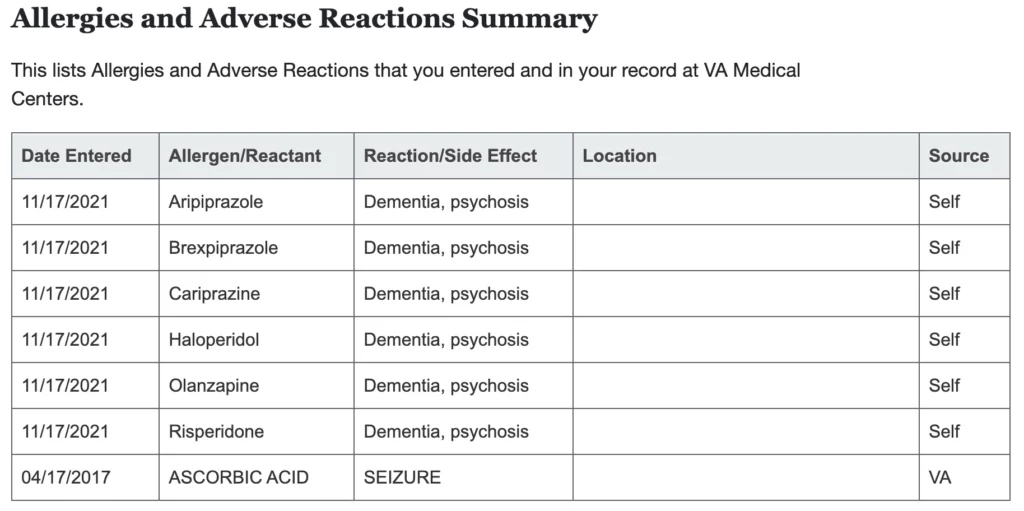
Lewy Body Dementia Fast Decline? Causes, Info and Examples
This post may contain affiliate links or Google Ads and we may earn a small commission when you click on the links at no additional cost to you. As an Amazon Affiliate, we earn from qualifying purchases. This is at no additional cost to you and helps with our website expenses.
Lewy Body Dementia (LBD) is a progressive neurological disorder that causes deterioration of cognitive ability, personality changes, and physical symptoms such as movement difficulties. A Lewy Body Dementia fast decline may be noticed towards the very beginning of a diagnosis. It may level off and even improve after that and then have other rapid declines as the disease progresses. For many, it is a roller coaster of a ride.

The rate at which LBD progresses can vary greatly from person to person. Some people with LBD experience a rapid decline while others may have a more gradual decline over several years. There is no known cure for LBD and currently no treatments that can stop or reverse the progression of the disease. However, there are some treatments available that can help manage symptoms and improve quality of life.
Symptoms that might appear during the decline include:
- Lack of mobility
- Crying
- Slurred speech
- Not knowing how to use the bathroom
- Confusion about where rooms in the house are
- Increased hallucinations
- Delusions (perhaps that a spouse is cheating)
- Paranoia
- Capgras syndrome
What causes these sudden Lewy Body Dementia fast declines?
It is unclear whether Lewy Body Dementia progresses faster in younger patients, especially those with early onset. Generally, the earlier a person is diagnosed with dementia, the more rapid the progression of symptoms may be. However, age at diagnosis can not always accurately predict how fast Lewy Body Dementia will progress.
The speed of decline also depends on other factors such as genetics, general health, and lifestyle habits. For instance, people with poor physical health are likely to experience more rapid declines than those who take care of themselves and stay active.
Additionally, some studies suggest that certain genetic markers may increase the risk for faster declines in cognitive function among Lewy Body Dementia patients.
To best manage the symptoms of a Lewy Body Dementia fast decline, it is important to identify and treat any underlying medical conditions that can accelerate cognitive decline.
It is also beneficial for patients to practice healthy lifestyle habits such as engaging in regular physical activity and taking steps to promote good mental health. While there is no definitive way to slow down the progression of Lewy Body Dementia, taking these proactive measures may help improve the quality of life for those living with the condition.
Causes that might be behind a Lewy Body Dementia fast decline.
Lewy Body Dementia Fast Decline Caused by a Uterine Tract Infection
One of the most concerning underlying medical conditions that can cause a fast decline in Lewy Body Dementia patients is a urinary tract infection (UTI). UTIs are caused by bacteria and can spread to the brain if left untreated. In people with Lewy Body Dementia, this infection may cause confusion, changes in behavior, or increased agitation.
UTIs can quickly spread to other parts of the body and lead to fever, chills, confusion, and agitation. These symptoms can worsen existing dementia symptoms or even trigger a sudden decline in cognition or physical health.
It is important for loved ones to monitor patients closely for signs of a UTI and seek medical treatment right away if they suspect it might be present. With prompt treatment antibiotics, these infections can often be resolved quickly and hopefully help slow down any rapid declines in cognitive function caused by the illness.
Dehydration in LBD
Dehydration is one of the most common causes of decline. When people with LBD become dehydrated, their symptoms tend to worsen very quickly. In some cases, dehydration can cause Lewy Body Dementia to progress so rapidly that the person experiences a rapid decline in their health.
Dehydration can also cause other serious health problems, such as kidney failure. Therefore, it is important for people with Lewy Body Dementia to stay well-hydrated.
Hospitalizations can cause a big Downhill Turn
Hospitalization can be a major cause of a rapid decline in Lewy Body Dementia patients. Hospital stays for any reason can put people with LBD at an increased risk for complications, including falls and infections, which can trigger a fast decline in their symptoms.
In addition to the physical toll that hospitalizations take on the body, it is also important to consider the psychological impact of these experiences. People with dementia may become disoriented or confused during their stay in the hospital, leading to confusion and agitated behavior that can worsen their overall health and cognition.
Overall, it is important to recognize that hospitalization carries additional risks for those affected by Lewy Body Dementia and should be approached with caution. If hospitalization is necessary, it is important to take steps to ensure that the person’s safety and comfort are prioritized.
My husband was hospitalized for low sodium several times. He took a drastic turn for the worse each time. I believe it was a combination of the hospitalization and the low sodium. However, he has improved each time after coming home.
Author
Anesthesia can cause a Fast Decline in Lewy Body Dementia Patients
Anesthesia can be a major cause of rapid decline in people with Lewy Body Dementia. Anesthesia is commonly used during medical procedures or surgeries, but it can have an adverse effect on those affected by LBD. Studies have shown that anesthesia can impair the brain’s ability to process information and disrupt how it communicates with other parts of the body.
This disruption can lead to confusion, agitation, and unpredictable behavior in people with Lewy Body Dementia. It is important for loved ones to discuss any potential risks associated with anesthesia with a doctor before it is given to someone living with LBD. Additionally, if possible, anesthesia should be avoided unless absolutely necessary as it poses a significant risk for the rapid decline in those affected.
We have declined a surgery my husband needed. It was not absolutely necessary and would have required a general anesthesia and hospital stay. We consulted with all of his doctors and they all agreed that, if possible, not having the surgery was the best thing to do.
Author
Certain Medications can cause a Lewy Body Dementia Fast Decline
Certain medications can cause a rapid decline in Lewy Body Dementia patients. Medications to avoid include:
- haloperidol (Haldol),
- fluphenazine (Prolixin)
- chlorpromazine (Thorazine)
- loxitam
- mellaril
- moban
- navane
- prolixin
- serentil
- trilafon
- anticholinergics
- benzodiazepines
These medications are known to have severe side effects, including confusion, agitation, and increased risk of falls.
It is important for loved ones to make sure that any doctor treating someone with LBD is aware of these risks and has taken all necessary steps to prevent the use of these medications. Additionally, it may be beneficial to list these medications as allergies on all medical records in order to ensure that they don’t accidentally get prescribed.

Parkinson’s Disease Medicines
Some of the medications commonly used to treat Parkinson’s Disease, such as levodopa and dopamine agonists, can have a negative effect on those with Lewy Body Dementia. These drugs increase brain activity which can be too much for someone with LBD. This overactivity can lead to confusion and agitation, resulting in a rapid decline in cognitive functioning.
Carbidopa/Levodopa is often prescribed for LBD patients because they often have tremors and symptoms found in Parkinson’s. Dosage amounts may need to be adjusted to find what works for each person.
It is important for doctors to understand the patient’s full health history before starting any medication as some drug therapies may worsen symptoms due to their effects on the nervous system.
Additionally, close monitoring should be done when starting these medications so that any adverse side effects can be identified right away and addressed quickly.
We had to lower dosages till we found the right amount. He is now on a minimal amount of Sinemet. The higher dosages caused him to have more hallucinations and delusions.
Author
A Fall can cause a Fast Decline in Lewy Body Dementia Patients
Falls are a common occurrence among those affected by Lewy Body Dementia, and these falls can often lead to rapid decline. When someone with LBD experiences a fall, they may suffer from head trauma as well as other physical injuries that can worsen their condition and cause confusion or agitation. These symptoms can rapidly worsen the cognitive abilities of the person with LBD and significantly impact their quality of life.
Therefore, it is important for loved ones to take steps to decrease the potential for falls, such as ensuring that there is adequate lighting throughout the home, removing loose rugs and other hazardous obstacles, adding grab bars to bathrooms, and providing physical support when needed. Additionally, if a fall does occur, it is important to seek medical attention right away to address any head trauma or other injuries that may have been sustained.
Low Sodium can Cause a Decline
Low sodium levels can lead to a rapid decline in those with Lewy Body Dementia. When sodium levels are low, it can cause confusion and agitation which can worsen the cognitive abilities of someone with LBD. Low sodium levels can also cause feelings of weakness, fatigue, and dizziness which may further complicate an LBD patient’s quality of life.
It is important for doctors to regularly check sodium levels in patients living with LBD and take necessary steps to maintain them within normal ranges. Additionally, caretakers should make sure that those they are caring for have access to healthy foods that will help keep their sodium levels up such as fruits and vegetables.
High Sodium Levels can Cause Lewy Body Dementia Patients to Get Worse
High sodium levels can also be dangerous for someone living with Lewy Body Dementia and should be avoided. High sodium levels can cause confusion, headaches, and dizziness which can rapidly worsen the condition of someone with LBD.
It is important to monitor sodium levels regularly in order to ensure that they remain within safe ranges. Additionally, it is important to avoid foods that are high in sodium such as processed food or canned goods as these will not help keep sodium levels balanced. Healthy foods such as fruits and vegetables should be consumed instead to maintain normal salt levels.
In conclusion, there are several factors that can contribute to a fast decline in Lewy Body Dementia patients. It is important for caregivers and loved ones to be aware of these risks and monitor patients closely so they can seek medical attention right away if needed. Additionally, taking proactive measures such as healthy lifestyle habits and staying hydrated may help slow down the decline in those living with LBD.




